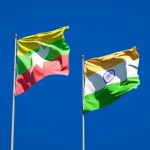Foreign Secretary Harsh Vardhan Shringla is currently on a crucial diplomatic mission. He is visiting Myanmar to hold discussions with the military government and the opposition which continues to strive for the restoration of democracy, derailed by the military coup on February 1. This is Shringla’s second visit to the crisis-hit country in 14 months. In October 2020, he traveled to Naypyitaw with General M.M. Naravane, Chief of Army Staff.
The goals of the current visit are not difficult to fathom. Several recent developments have necessitated a high-level dialogue with Naypyitaw. First, the fatal attack on Colonel Viplav Tripathi, his wife and their infant son, together with four other men of the Assam Rifles in an ambush on November 13, demonstrated the reinvigoration of insurgent activity along the India-Myanmar border. Insurgent outfits – the People’s Liberation Army (PLA) and Manipur Naga People’s Front (MNPF) – involved in smuggling operations, are known to be behind this attack. Second, the influx of thousands of people escaping army oppression to seek shelter in Mizoram continues. So does the pressure by the Mizoram government on Delhi to allocate resources for meeting their needs.
Discussions in Naypyitaw are thus certain to focus on re-establishing a mutually satisfactory border management regime that the two governments are committed to. But new issues may have been added to the agenda. India is keen to step up its humanitarian assistance to a neighbour seriously ravaged by Coronavirus. The government has already supplied 2.7 million vaccine doses and wants to do more. Another driver is the imperative to review the slowdown in the implementation of the bilateral mega projects – the Trilateral Highway and the Kaladan multimodal connectivity between India’s Northeast and Myanmar’s Sittwe port. Instability caused by the coup can be remedied by measures of practical cooperation.
This visit, however, has a wider diplomatic agenda that transcends bilateral matters. The Myanmar government’s failure to adhere to the ‘Five-Point Consensus’ crafted by ASEAN has created an unprecedented situation. Senior General Min Aung Hlaing who is the Prime Minister and Commander-in-Chief, was barred from attending the annual summits of ASEAN and the China-ASEAN summit recently.
A new dimension has now been introduced as the ASEAN chair shifts from Brunei to Cambodia, which wants to end Myanmar’s isolation. Cambodian Prime Minister Hun Sen has already received the Myanmar foreign minister and announced his plan to visit Myanmar in early January, much to the consternation of several ASEAN member-states.
In this effort, Cambodia is not alone. China, Japan and Thailand have had contacts at the ministerial and senior official levels with the leadership. Sun Guoxiang, the Chinese special envoy, has had two meetings with the senior general. Russia has had a steady exchange of visits by military officials, the latest during the visit of a Russian warship to Myanmar. On December 1, President Vladimir Putin stated that “joint efforts” could further develop Russia-Myanmar cooperation in “economic, military-technical and educational spheres.” Despite its policy of sanctions, the U.S. too kept up the contacts through the visit of Bill Richardson, former U.S. ambassador and governor of New Mexico, which resulted in the release of imprisoned U.S. journalist Danny Fenster.
In strategic terms, India is keen to shape the changing regional equations. A key objective is to arrest China’s broadening footprint in Myanmar. Japan and India have a strong convergence in strengthening democracy, without weakening the military leadership. The other Quad members – the U.S. and Australia – need to be persuaded to appreciate the bigger picture.
The most delicate aspect of Shringla’s mission is to execute and project the dual-track policy: refurbish time-tested ties of cooperation with the military, while extending clear support for the cause of democracy. As the world’s largest democracy, India fully supports the restoration of democracy and the release of political leaders. That is why New Delhi felt deeply “disturbed” by the court’s unfair verdict delivered against Daw Aung San Suu Kyi. Given the fraught situation, Shringla is unlikely to meet her, but his discussions with other prominent opposition figures will strengthen New Delhi’s record of supporting democracy.
Myanmar’s leaders have to learn to serve their people better. Inclusive democracy is the only way out of the tragic impasse. As veteran Myanmar watcher Bertil Lintner observed aptly: “The bitter truth remains that Myanmar’s future lies in the hands of its people.” Foreign Secretary Shringla is attempting to help them while safeguarding India’s national security.
This article was first published in Times of India.
Rajiv Bhatia is Distinguished Fellow, Gateway House and a former Ambassador to Myanmar.


